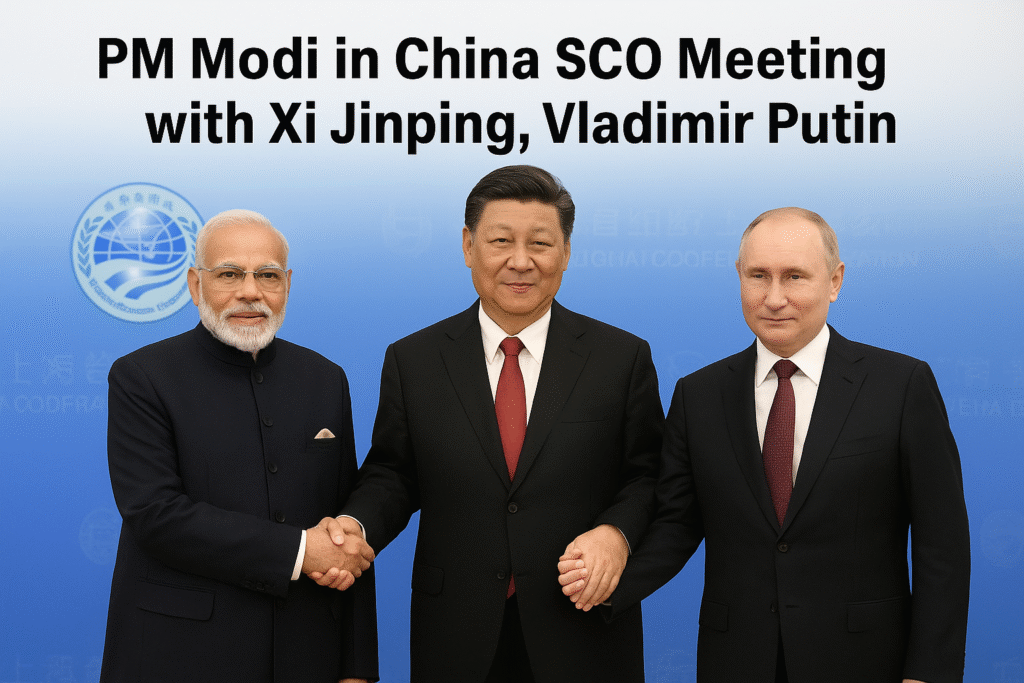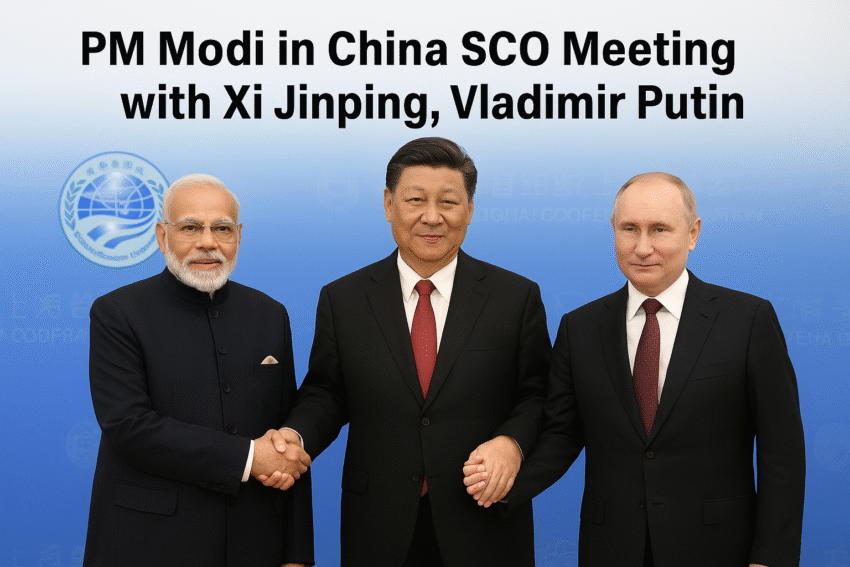
Prime Minister Narendra Modi has landed in China ahead of the much-anticipated Shanghai Cooperation Organization (SCO) Summit, where he will hold crucial bilateral meetings with Chinese President Xi Jinping and Russian President Vladimir Putin. The visit, which comes at a time of shifting global alliances and heightened geopolitical tensions, underscores India’s strategic role in the Eurasian bloc.
India’s Strategic Agenda at SCO
The focus keyword – PM Modi in China SCO meeting – is being closely tracked by global observers as New Delhi looks to strengthen ties while balancing challenges from both East and West. For India, the SCO Summit is not just another diplomatic event; it is an opportunity to reshape narratives around trade, security, connectivity, and counterterrorism.
India has long maintained that regional cooperation must be based on sovereignty, equality, and non-interference. At the SCO meeting in China, PM Modi is expected to push for stronger measures against cross-border terrorism, digital connectivity, and inclusive economic growth across member nations.
Meeting Xi Jinping: Balancing Tensions with Cooperation
PM Modi’s scheduled meeting with Chinese President Xi Jinping will attract maximum attention. India-China relations remain strained after the 2020 Galwan Valley clash, but both nations have continued to engage diplomatically. The PM Modi Xi Jinping SCO talks are expected to cover:
- Border management and peace at the Line of Actual Control (LAC).
- Enhancing trade despite global supply chain challenges.
- Joint initiatives in renewable energy and technology cooperation.
Analysts say Modi’s presence in China is an indication that India wants to maintain open channels with Beijing, even as it strengthens its partnerships with the U.S., Japan, and Australia under the Quad grouping.
Vladimir Putin Meeting: Energy and Trade in Focus
Equally significant is PM Modi’s meeting with Russian President Vladimir Putin. With the U.S. recently slapping 50% tariffs on Indian goods and the West continuing sanctions on Russia, the PM Modi Putin SCO meeting could open up new opportunities in energy, defense, and trade.
India has been steadily increasing its Russian oil imports, despite global criticism, to keep inflation under control. The bilateral talks will likely touch upon:
- Expanding energy cooperation (oil and gas).
- Defense supplies and joint military exercises.
- A rupee-ruble payment mechanism for smoother trade settlements.
For Moscow, India remains a reliable partner in Asia, and for New Delhi, Russia is vital for balancing its strategic autonomy.
SCO Summit: Regional and Global Implications
The SCO Summit in China will not just be about bilateral meetings. With leaders from Central Asian republics, Pakistan, and Iran also attending, discussions will likely include:
- Security threats from Afghanistan after Taliban’s takeover.
- Trade corridors linking South Asia with Central Asia.
- Cybersecurity, artificial intelligence, and digital economy cooperation.
India has consistently advocated for connectivity projects that respect sovereignty and transparency – a subtle reminder of its opposition to China’s Belt and Road Initiative (BRI).
Why This SCO Meeting Matters for India
The presence of PM Modi in China for the SCO Summit with Xi Jinping and Vladimir Putin reflects India’s growing diplomatic agility. At a time when global politics is shaped by the U.S.-China rivalry, the Russia-Ukraine conflict, and volatile oil markets, New Delhi is ensuring its voice is heard.
India’s proactive stance at the SCO is also aimed at strengthening its image as a global mediator – one that can talk to Washington and Moscow, maintain dialogue with Beijing, and still uphold its democratic values and independent foreign policy.
Conclusion
The PM Modi SCO meeting in China with Xi Jinping and Vladimir Putin is more than symbolic. It signals India’s determination to protect its economic interests, push for regional stability, and play a bigger role in shaping the multipolar world order.
As the meetings unfold, the outcomes could have lasting implications not just for India, but for Asia’s broader strategic balance.

